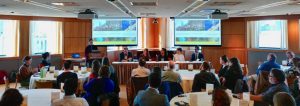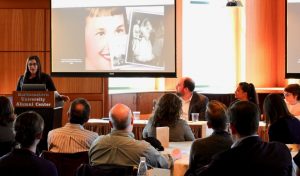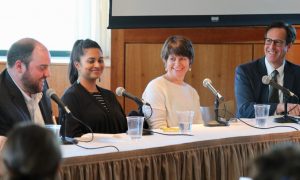
On Monday, April 23 – five years and a week after tragedy struck Boston in the form of the Boston Marathon bombing – faculty, staff, students and members of the community gathered in Alumni Center to share reflections on remembering traumatic events and processing grief through collections and digital archives. The event commemorated five years of collecting objects and memories in “Our Marathon: the Boston Bombing Digital Archive,” a project that originated at Northeastern through efforts in the NULab for Texts, Maps and Networks, the College of Social Sciences and Humanities, and the Northeastern University Libraries. This year, faculty, staff and graduate students worked to migrate the site’s contents and metadata onto a
new digital space under library management, giving it a long-term home where the collection can be preserved. Megan Barney, Lauren Bergnes Sell and David Heilbrun will reflect on their experience completing this migration in future blog posts.
The event featured a panel of scholars whose work has been grounded in collecting and preserving so-called “grief archives,” including:
- Dan Cohen, Vice Provost for Information Collaboration and Dean of University Libraries and co-director of the 9/11 Digital Archive
- Ashley Maynor, award-winning filmmaker behind The Story of the Stuff and currently Digital Scholarship Librarian at New York University
- Elizabeth Maddock Dillon, Our Marathon Principal Investigator and currently Professor of English at Northeastern University
- Kristi Girdharry, the Our Marathon Oral History Project Manager and currently Assistant Professor of English at Johnson and Wales University
- Jim McGrath, Co-director of the Our Marathon project and currently post-doctoral Fellow in Digital Public Humanities at Brown University.

Amanda Rust introduces panelists
Amanda Rust, Assistant Director of the Digital Scholarship Group, introduced the panelists to a packed crowd including university professors, graduate students, library staff, community members and project partners from outside Northeastern.
As moderator, Cohen discussed findings and recollections from his experience as co-director of the 9/11 Digital Archive. He noted the emotional intelligence required to do this kind of work, especially in regards to community engagement.
Maynor, the filmmaker behind
The Story of the Stuff, set the stage by discussing the therapeutic effect of saving and organizing objects across various circumstances like family archives and spontaneous shrines. She noted that the value of such archives can be that they protect objects, put away for safekeeping; we know they are there, but we don’t have to look at them anymore.

Ashley Maynor
Girdharry and McGrath joined Maddock Dillon in a discussion of the process and outcome of the Our Marathon digital archive. Girdharry spoke to her work as Oral History Project Manager, where she discovered the clusters of stories that emerged from a wide range of personal experiences. She pointed out the different angles of narrative involved to tell a more complete story of the events of that day. Maddock Dillon, the project’s principal investigator, also highlighted the collective nature of the archive, drawn from crowdsourced objects and memories, and the collective labor that went into producing and maintaining it. These aspects, she said, along with the desire to enable the community to reclaim the narrative, drove the project’s name, “
Our Marathon.”

From left: Jim McGrath; Kristi Girdharry; Elizabeth Maddock Dillon; Dan Cohen
As co-director of the project, McGrath has been highly involved in the archive from conception to its move to a new home in the library. McGrath initiated the collection’s move to a more permanent web space, and it is thanks to his persistence and care that the Our Marathon digital archive will continue to be accessible. During the panel, he pointed out the critical importance of community engagement in doing this kind of work, and how listening to the needs and values of multiple communities can correct our assumptions. He has written more about his long-term experience on the project at the National Council on Public History blog
History@Work.
After listening to the panel presentation, the audience asked questions about the labor and process of managing such collections and the role of the digital in future work.
The Our Marathon: Boston Bombing Digital Archive is viewable at
https://marathon.library.northeastern.edu/about/.
 On Monday, April 23 – five years and a week after tragedy struck Boston in the form of the Boston Marathon bombing – faculty, staff, students and members of the community gathered in Alumni Center to share reflections on remembering traumatic events and processing grief through collections and digital archives. The event commemorated five years of collecting objects and memories in “Our Marathon: the Boston Bombing Digital Archive,” a project that originated at Northeastern through efforts in the NULab for Texts, Maps and Networks, the College of Social Sciences and Humanities, and the Northeastern University Libraries. This year, faculty, staff and graduate students worked to migrate the site’s contents and metadata onto a new digital space under library management, giving it a long-term home where the collection can be preserved. Megan Barney, Lauren Bergnes Sell and David Heilbrun will reflect on their experience completing this migration in future blog posts.
The event featured a panel of scholars whose work has been grounded in collecting and preserving so-called “grief archives,” including:
On Monday, April 23 – five years and a week after tragedy struck Boston in the form of the Boston Marathon bombing – faculty, staff, students and members of the community gathered in Alumni Center to share reflections on remembering traumatic events and processing grief through collections and digital archives. The event commemorated five years of collecting objects and memories in “Our Marathon: the Boston Bombing Digital Archive,” a project that originated at Northeastern through efforts in the NULab for Texts, Maps and Networks, the College of Social Sciences and Humanities, and the Northeastern University Libraries. This year, faculty, staff and graduate students worked to migrate the site’s contents and metadata onto a new digital space under library management, giving it a long-term home where the collection can be preserved. Megan Barney, Lauren Bergnes Sell and David Heilbrun will reflect on their experience completing this migration in future blog posts.
The event featured a panel of scholars whose work has been grounded in collecting and preserving so-called “grief archives,” including:


